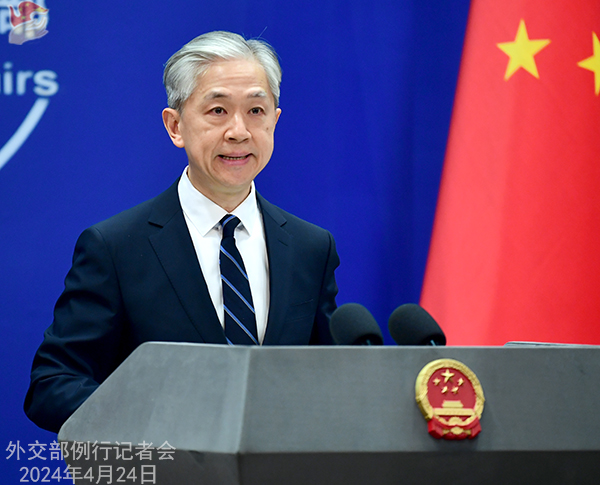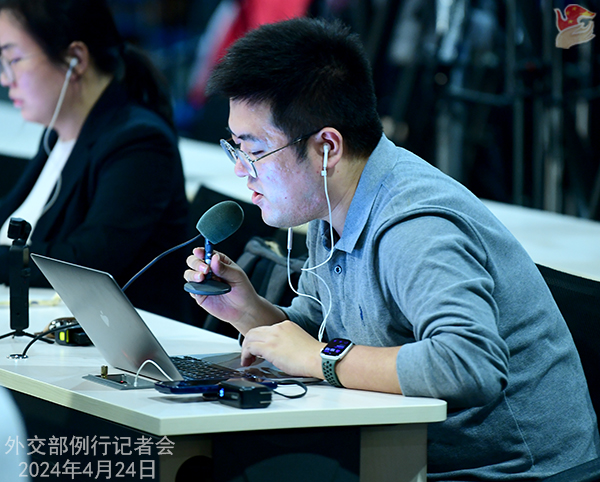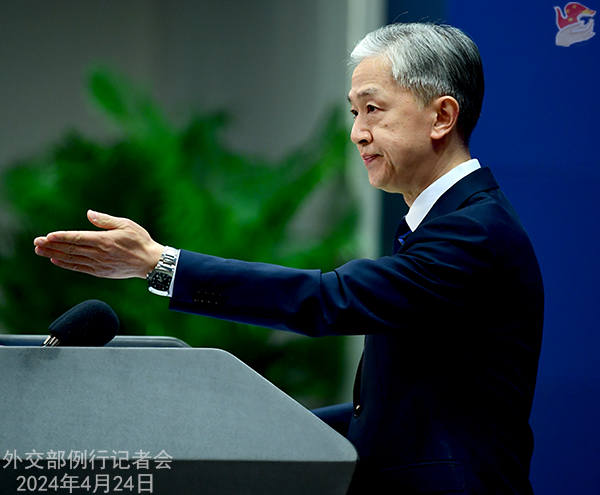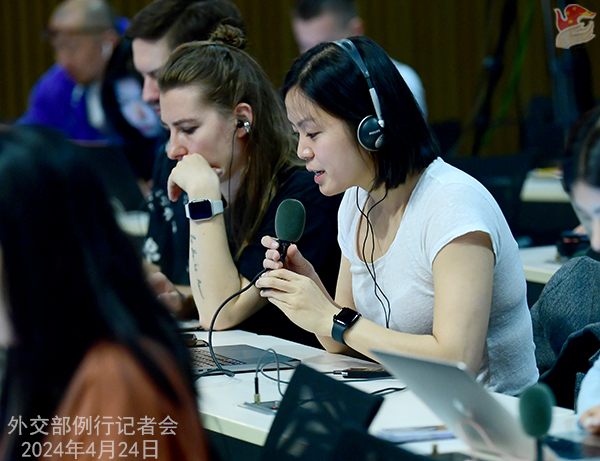
Reuters: The US Senate voted on Tuesday in favor of a legislation that would ban TikTok in the US if ByteDance fails to divest the app over the next nine months to a year. Does the Foreign Ministry have anything to offer on this matter?
Wang Wenbin: My colleagues, myself and the spokesperson of the Ministry of Commerce have previously made clear China’s principled position on the US Congress’s passage of the bill on TikTok, which you may refer to.
Dragon TV: We noted that after China’s National Bureau of Statistics released statistics about China’s economy in the first quarter of 2024, several international financial institutions, including Goldman Sachs, Morgan Stanley and Deutsche Bank, adjusted up China’s growth forecast for this year. What is your comment on this?
Wang Wenbin: China’s economy got off to a good start in the first quarter this year. The “troika” growth drivers of consumption, investment and export witnessed sound performance, and the four macroeconomic indicators of growth, employment, inflation and balance of payments are generally stable. Spring is in the air for China’s economy. In the first quarter, China’s GDP grew by 5.3 percent year-on-year. Domestic demand was the major contributor and accounted for 85.5 percent of that growth.
The United Nations Conference on Trade and Development estimated in its report that China will hit this year’s growth target of around 5 percent. In the 2024 Foreign Direct Investment Confidence Index released by US management consulting firm Kearney, China rose from last year’s seventh position to the third. Bloomberg reported that China is projected to account for the biggest share of the world’s new economic activity for the next five years.
China’s economy will stay on a sound and upward trajectory for the long haul. We believe that as China presses ahead with high-quality development and high-standard opening up, the Chinese economy will be transformed and upgraded at an even faster pace while sustaining steady growth and will contribute more to the global economy.
CNN: Concerning the legislation that was passed by the United States’ lawmakers dealing with both Taiwan and TikTok, a two-part question. First, what will China’s message be on this as Secretary of State Antony Blinken travels the country? Secondly, what is the view of the Chinese government, should ByteDance challenge this legislation or would it be better to leave the American market altogether?
Wang Wenbin: On TikTok, we have clearly stated China’s principled position and I have nothing more to add today.
On Secretary Blinken’s visit, we spoke on it a few times in the past two days. The head of the MFA Department of North American and Oceanian Affairs also gave a background briefing. You may refer to what has been said.

Bloomberg: I have a question about the EU. The EU this morning at China time announced that they were starting an investigation into Chinese market access to the government procurement of medical devices. Does China have any comment on this new statement from the EU?
Wang Wenbin: The EU has been frequently using its economic and trade “toolkit” and trade remedies. The moves send out a signal of protectionism, aim at Chinese companies and hurt the EU’s own image. The EU says it is the most open market in the world, but as the world can see, the EU is clearly inching toward protectionism. We urge the EU to honor its commitment to open market and the principle of fair competition, observe WTO rules and stop going after and restraining Chinese companies under various pretexts.
Bloomberg: A follow-up on the EU question. You urge the EU to abide by the WTO regulations. When China joined the WTO in 2001, it promised to join the government procurement agreement as soon as possible. China actually applied to join that in 2007 but has never actually joined. Does China ever intend to join the government procurement agreement? And if you don’t, why should the EU give you the same access to their market that other countries have to join the agreement to get when you won’t give them the access to your market?
Wang Wenbin: On China’s application to the WTO Agreement on Government Procurement (GPA), I would refer you to the competent authorities.
Let me say that China has honored its commitments upon accession to the WTO and been exemplary in abiding by WTO rules, which is often recognized by the WTO.
Since our accession to the WTO, China, as the largest developing member, has firmly upheld the multilateral trade regime, practiced true multilateralism and delivered on its commitments to the WTO. China has improved the socialist market economy system and legal system in light of China’s national realities, expanded high-standard institutional opening up and been fully and deeply engaged in WTO reform. We have actively helped other developing members, especially the least developed countries, integrate themselves into the multilateral trade regime. During the past year, China became the first major developing country to complete the approval procedure of the Agreement on Fisheries Subsidies, played a leading role in the conclusion of the negotiation on the text of the Investment Facilitation for Development Agreement, and facilitated the WTO’s substantial conclusion of negotiations on a number of global digital trade rules. China’s active and constructive role is widely commended, and China’s contribution to the WTO and global economy and trade is well recognized.
CRI: It’s reported that according to the outcome of the 8th meeting of the State Commissions on the delimitation of the state border between Armenia and Azerbaijan held days ago, Armenia and Azerbaijan have agreed to begin the delimitation process and reached preliminary agreement to start with the northern sections of the borderline. What’s China’s comments?
Wang Wenbin: China noted the reports. Both Azerbaijan and Armenia are China’s friends and cooperation partners. China welcomes the progress made by the two countries in the normalization process. We hope Azerbaijan and Armenia will continue working together to resolve differences and disputes through dialogue and consultation and advance peace, stability, and prosperity in the region.
Bloomberg: Just to follow up on the WTO question, you said that China is a leading member of the WTO and has been appreciated for the efforts it has made to support free trade. But China is not a member of the government procurement agreement, which guarantees freedom of access for members of that agreement. So my question is, why does China think it should have free access to the European market for procurement when China doesn’t provide that access to its own market to European companies and also to companies from all the other WTO members?
Wang Wenbin: I do not think that is an accurate description. According to my knowledge, China has actively applied to join the WTO Agreement on Government Procurement. If you are interested in the specifics, I’d refer you to competent Chinese authorities.
What I can tell you is that China is committed to fostering a market-oriented, law-based and world-class business environment. China’s market is open to the world and we are committed to making it a market for the world and a market accessible to all. As I mentioned just now, US management consulting firm Kearney released the 2024 Foreign Direct Investment Confidence Index, which lifts China from last year’s seventh place to the third, a clear indication of China’s greater openness to the world.
New York Times: Will the timing of the Senate bill’s passage affect the discussions with Secretary Blinken in the coming days and does China have a comment on the USD 8 billion in funding to Taiwan and the Indo-Pacific that were part of the bill?
Wang Wenbin: We’ve shared our views in detail regarding Secretary Blinken’s visit to China, which you may refer to.
I would like to stress that getting closer militarily between the United States and the Taiwan region will not make the latter safer or save “Taiwan independence” from failure. It will only heighten tensions and the risk of conflict and confrontation in the Taiwan Strait, and will eventually backfire. The US needs to abide by the one-China principle and the provisions of the three China-US joint communiqués, act on its leader’s commitment of not supporting “Taiwan independence,” stop arming Taiwan, stop creating new factors that could lead to tensions in the Taiwan Strait and stop endangering peace and stability in the Taiwan Strait. China will closely follow the developments of the bill and take resolute measures to safeguard its sovereignty, security and territorial integrity.

Financial Times: As part of an anti-subsidies investigation, the EU raided offices of a Chinese security company in the Netherlands and Poland and seized IT equipment and mobile phones. Does China have any comment on this?
Wang Wenbin: I can answer that with my response to the question about the EU investigation into Chinese public procurement for medical devices. We urge the EU to honor its commitment to open market and the principle of fair competition, observe WTO rules, and stop wantonly going after and restraining Chinese companies under various pretexts.
CCTV: The G7 Foreign Ministers’ Meeting issued a communiqué recently, claiming that China’s non-market policies and practices are leading to “overcapacity.” The US side claimed that Secretary of State Antony Blinken will express concerns on “overcapacity” during his visit to China. What is China’s comment?
Wang Wenbin: Some Western countries have lately been accusing China of “overcapacity.” This is baseless hype and we firmly reject it.
Let me use our new energy sector as an example: First, China’s new energy sector capacity is advanced and much-needed capacity for green development, not “overcapacity.” According to the estimates of the International Energy Agency, based on the announced carbon neutrality targets, by 2030, global demand for new energy vehicles will reach 45 million, 4.5 times that of 2022, and global demand for new photovoltaic installations will also soar. The challenge facing the world is not overcapacity, but a severe shortage of capacity in the new energy sector. China’s green technology and products, especially the growth of our new energy industry, meet countries’ need to address the energy crisis and respond to climate change, and will make important contribution to the global green and low-carbon transition.
Second, the rapid growth of China’s new energy industry is determined by the laws of economics and market factors, not subsidies. China’s new energy products are competitive because we started out early and have kept investing in its R&D. Hence a leading edge in technology. Combined with China’s vast range of supporting industries, mega-size market and rich human resources, that leading edge becomes integrated competitiveness. As Premier Li Qiang said, China’s leading edge in new energy is a result of strong performance and full market competition, not government subsidies.
Third, accusing China’s new energy industry of overcapacity is a sign of protectionism. Bloomberg analysis shows that in the EV sector, the capacity usage rates of the majority of China’s leading auto exporters are considered normal; the ratio of exports to production is far lower than other car producing nations such as Germany, Japan, and the ROK; and Chinese companies aren’t dumping EVs on global markets, for the export prices of those cars reflect the laws of the market. In our view, the “overcapacity” rhetoric is just an excuse for protectionism. To limit the export of China’s new energy products, such as electric vehicles, will make everybody lose. The world doesn’t want less of China’s capacity, but more funding and products to speed up energy transition and reduce poverty.
China stands by its basic national policy of opening up. We are ready to work with all parties to uphold fair competition and benefit from cooperation together. We hope relevant countries will stay open, observe the principles of market economy and international trade rules, and provide a fair, transparent, open, and non-discriminatory environment for Chinese businesses.
Bloomberg: Yesterday you were asked about the arrest of four people in Germany on accusations of spying for China. At the time you said that these were hype-up attempts to smear China and were examples of Cold-War thinking. Since you spoke yesterday, the Europeans have opened another investigation into China’s business practices and they’ve also raided a Chinese company in Europe. Do you also see these two actions in the last 24 hours by the European authorities as more hyping-up of the “China threat” as an attempt to smear China and its business practices?
Wang Wenbin: I’ve made clear China’s position on the EU investigation into Chinese public procurement for medical devices.
On the so-called case of “Chinese spies,” I made China’s position clear yesterday. Let me stress again that China builds its ties with European countries on the basis of mutual respect, mutually beneficial cooperation, equality and non-interference in each other’s internal affairs. We urge relevant parties to stop chasing shadows and vilifying China.







